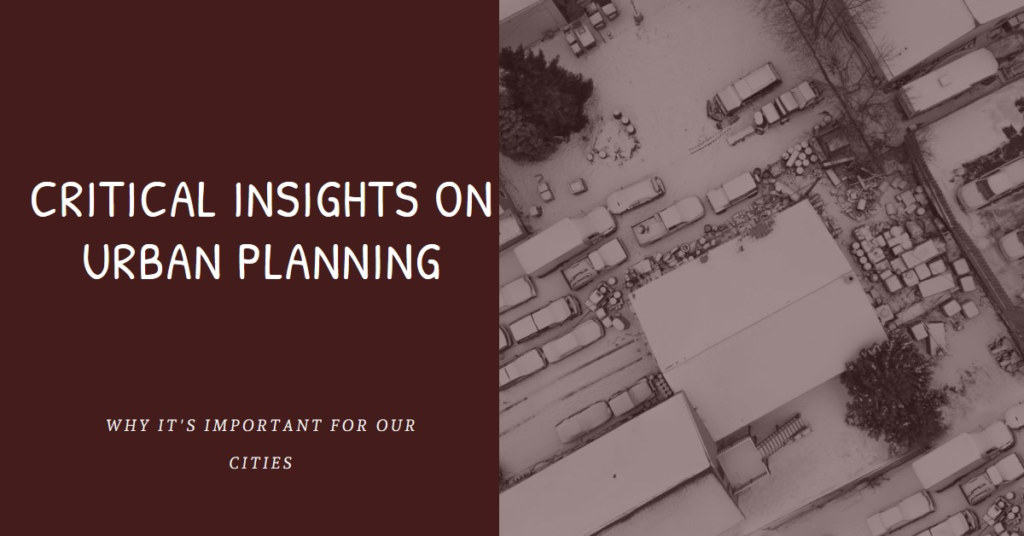
Table of Contents
- Introduction: The Role of Urban Planning
- Mitigating Urban Sprawl: A Necessity for Sustainable Growth
- Enhancing Quality of Life: Creating Livable Communities
- Economic Vitality: Driving Sustainable Development
- Addressing Climate Change: Building Resilient Cities
- Promoting Social Equity: Inclusive Urban Development
- Preserving Cultural Heritage: Balancing Tradition and Modernity
- Efficient Infrastructure: Supporting Urban Functionality
- Public Health and Safety: A Core Responsibility
- Future-Proofing Cities: Anticipating Change
- Conclusion: The Indispensable Need for Urban Planning
Introduction: The Role of Urban Planning
Urban planning is a fundamental aspect of modern civilization. It involves the careful design and regulation of the use of land and the environment, ensuring the sustainable and efficient development of urban areas. This process is essential for creating livable cities that can accommodate growing populations while maintaining a high quality of life.
Urban planning addresses the complexities of city development, balancing the needs of residential, commercial, and industrial sectors. Planners consider various factors, including infrastructure, transportation, housing, and public spaces, to create cohesive and functional urban environments. Without urban planning, cities could become chaotic and inefficient, negatively impacting residents’ well-being.
Mitigating Urban Sprawl: A Necessity for Sustainable Growth
Urban sprawl, the uncontrolled expansion of urban areas, poses significant challenges to sustainability. Urban planning is crucial in mitigating this phenomenon by promoting compact and efficient land use. By encouraging higher-density development and mixed-use neighborhoods, planners can reduce the need for extensive infrastructure and transportation networks, ultimately conserving resources and reducing environmental impact.
Moreover, urban planning helps preserve green spaces and agricultural land, which are often threatened by unchecked development. By implementing zoning regulations and land-use policies, planners can ensure that urban growth occurs in a manner that balances development needs with environmental conservation.
Enhancing Quality of Life: Creating Livable Communities
A primary objective of urban planning is to enhance the quality of life for residents. Planners design communities that offer easy access to essential services, recreational facilities, and public amenities. Thoughtfully planned neighborhoods can promote social interaction, foster a sense of community, and improve overall well-being.
Furthermore, urban planning addresses issues such as traffic congestion, air pollution, and noise, which can significantly impact residents’ health and quality of life. By implementing effective transportation strategies and promoting sustainable practices, planners can create healthier and more enjoyable living environments.
Economic Vitality: Driving Sustainable Development
Urban planning plays a vital role in driving economic development. Well-planned cities attract businesses, investors, and talent, creating a dynamic and prosperous economy. Planners focus on creating vibrant commercial districts, efficient transportation networks, and attractive public spaces that enhance the city’s appeal and competitiveness.
In addition, urban planning supports economic resilience by promoting diverse economic activities and industries. By fostering a balanced mix of commercial, residential, and industrial development, planners can ensure that cities remain economically robust and adaptable to changing market conditions.
Addressing Climate Change: Building Resilient Cities
Climate change presents one of the most pressing challenges of our time, and urban planning is critical in addressing its impacts. Planners incorporate climate resilience into urban design by promoting sustainable practices, such as green building standards, renewable energy use, and efficient water management systems. These measures help reduce the urban carbon footprint and enhance the city’s ability to withstand and recover from climate-related events.
Additionally, urban planning facilitates the development of green infrastructure, such as parks, green roofs, and urban forests, which can mitigate the effects of heat islands, improve air quality, and enhance biodiversity. By integrating climate considerations into urban planning, cities can become more resilient and adaptive to future challenges.
Promoting Social Equity: Inclusive Urban Development
Social equity is a core principle of urban planning. Planners strive to create inclusive cities that provide equal opportunities and access to resources for all residents, regardless of socioeconomic status. This involves addressing issues such as affordable housing, public transportation, and access to healthcare and education.
Urban planning also promotes community engagement and participation, ensuring that the voices of all residents are heard in the planning process. By fostering a sense of ownership and involvement, planners can create more equitable and just urban environments that reflect the diverse needs of their communities.
Preserving Cultural Heritage: Balancing Tradition and Modernity
Urban planning plays a crucial role in preserving cultural heritage while accommodating modern development needs. Planners work to protect historic sites, landmarks, and neighborhoods, ensuring that they are integrated into the contemporary urban fabric. This preservation fosters a sense of identity and continuity, enriching the cultural landscape of cities.
Moreover, urban planning can promote cultural diversity by supporting the development of cultural institutions, public art, and community spaces that celebrate different traditions and histories. By balancing tradition and modernity, planners can create vibrant and culturally rich urban environments.


Efficient Infrastructure: Supporting Urban Functionality
Infrastructure is the backbone of any city, and urban planning ensures its efficient development and management. Planners design and coordinate the construction of transportation networks, utilities, and public facilities, ensuring that they meet current and future demands. Effective infrastructure planning enhances connectivity, reduces congestion, and supports economic activities.
Additionally, urban planning promotes the integration of smart technologies into infrastructure systems, improving efficiency and sustainability. Smart grids, intelligent transportation systems, and advanced waste management solutions are examples of how urban planning can leverage technology to create more functional and resilient cities.
Public Health and Safety: A Core Responsibility
Urban planning has a direct impact on public health and safety. Planners design cities that promote physical activity, reduce pollution, and minimize health risks. By creating walkable neighborhoods, expanding green spaces, and ensuring access to healthcare facilities, urban planning can significantly improve public health outcomes.
Safety is another critical aspect of urban planning. Planners work to design safe and secure urban environments by incorporating principles of crime prevention through environmental design (CPTED), enhancing emergency response capabilities, and addressing potential hazards. Ensuring the safety and well-being of residents is a fundamental responsibility of urban planning.
Future-Proofing Cities: Anticipating Change
Urban planning is inherently forward-looking, anticipating and preparing for future changes and challenges. Planners analyze demographic trends, technological advancements, and environmental shifts to develop strategies that ensure the long-term sustainability and resilience of cities. This proactive approach enables cities to adapt to changing circumstances and thrive in the face of uncertainty.
Moreover, future-proofing cities involves fostering innovation and flexibility in urban design. By promoting adaptive reuse, modular construction, and flexible zoning policies, planners can create urban environments that can evolve and respond to emerging needs and opportunities.
Conclusion: The Indispensable Need for Urban Planning
In conclusion, urban planning is indispensable for the development of sustainable, livable, and resilient cities. It addresses a wide range of critical issues, from mitigating urban sprawl and enhancing quality of life to promoting economic vitality and addressing climate change. Urban planning also plays a crucial role in promoting social equity, preserving cultural heritage, and ensuring efficient infrastructure.
As cities continue to grow and face new challenges, the importance of urban planning will only increase. By embracing thoughtful and strategic planning, we can create urban environments that support the well-being of all residents and ensure a prosperous and sustainable future for generations to come.


